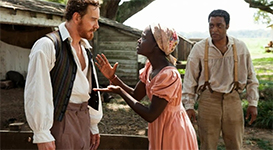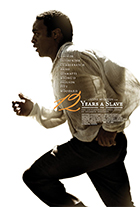12 Years a Slave
|  One of the most difficult scenes to watch in Steve McQueen’s 12 Years a Slave is not what you think it might be. It doesn’t involve lynching, or beatings, or whippings, or rape, or psychological torture, but rather the film’s protagonist, Solomon Northup, a born-freeman who was kidnapped and sold into slavery in the mid-1800s, trying and failing to write on stolen parchment with a pen he has carved out of a sugarcane stalk and ink made from blackberry juice. The pen doesn’t hold the liquid properly, which is too thin anyway to make legible marks, and he quickly gives up, recognizing that his crude attempt to replicate a small part of his former life has been in vain. In this one, frustrating moment we sense the enormity of what Solomon has lost and, even more so, what he is constantly in danger of losing: his sense of self. Torn from his life and family, brutally renamed and denied any personal history other than the one fabricated for him, Solomon is forced into inexpressiveness, denied a voice in every sense of the word. To admit that he was educated and is literate could mean his death, as would even a whisper about his real past. One of the most difficult scenes to watch in Steve McQueen’s 12 Years a Slave is not what you think it might be. It doesn’t involve lynching, or beatings, or whippings, or rape, or psychological torture, but rather the film’s protagonist, Solomon Northup, a born-freeman who was kidnapped and sold into slavery in the mid-1800s, trying and failing to write on stolen parchment with a pen he has carved out of a sugarcane stalk and ink made from blackberry juice. The pen doesn’t hold the liquid properly, which is too thin anyway to make legible marks, and he quickly gives up, recognizing that his crude attempt to replicate a small part of his former life has been in vain. In this one, frustrating moment we sense the enormity of what Solomon has lost and, even more so, what he is constantly in danger of losing: his sense of self. Torn from his life and family, brutally renamed and denied any personal history other than the one fabricated for him, Solomon is forced into inexpressiveness, denied a voice in every sense of the word. To admit that he was educated and is literate could mean his death, as would even a whisper about his real past.Scripted by John Ridley (Undercover Brother, Red Tails) from Northup’s 1853 memoir of the same title, 12 Years a Slave is hardly the first film about America’s great sin, “that peculiar institution” known as chattel slavery, but it is certainly one of the best, certainly the best since Jonathan Demme’s criminally underappreciated Beloved (1998). Like Steven Spielberg’s Schindler’s List (1993), a film to which it is frequently compared, it dares to look right into the face of institutionalized human evil and bear witness to the depths of its depravity. However, the reason the film works so well is because, like Spielberg’s film, it avoids an easy sense of moralizing and propels us deep into the characters’ experiences. Few if any people who see 12 Years a Slave could imagine what it would be like to be born into human bondage and live out the entirety of their lives as the property of another, but we can in some sense grapple with the prospect of losing what we have—our loved ones, our comforts, our sense of self—which is what makes identifying with Solomon and his plight such a harrowing ordeal. It makes us feel his pain in ways that other slave narratives might not because they unfold at both a historical and an emotional remove from our lived experience. 12 Years a Slave helps bridge that gap. Solomon was living in Saratoga Springs, New York, with his wife and two young children when he was lured to Washington, D.C. (then a slave “state”) under the false pretenses of playing violin at a circus. When he awakes after being drugged during dinner, he finds himself literally in shackles, and soon he is being beaten lest he answer to any name other than “Platt” and ferried away on a steamship headed for Louisiana. There he is sold by a slave trader (Paul Giamatti) to William Ford (Benedict Cumberbatch), a Baptist minister who treats his slaves with some sense of decency and humanity (as much as one can while still owning other human beings). However, Solomon infuriates Tibeats (Paul Dano), Ford’s chief carpenter, by repeatedly showing him up with his superior skills and intellect, and Ford is forced to sell Solomon to someone else to keep Tibeats from killing him. Unfortunately, he is sold to Edwin Epps (Michael Fassbender), a brutal taskmasker who owns a cotton plantation and treats his slaves with far less decency than Ford. As horrible as Solomon’s existence is on the Epps plantation, it ultimately pales in comparison to the ordeal endured by Patsey (Lupita Nyong’o), a young female slave with whom Epps is sexually obsessed, much to the consternation of his Lady Macbeth of a wife (Sarah Paulson). Thus caught between Epps’s sexual violence and his wife’s horrid jealousy, it is not surprising that, in one of the film’s most dramatically rending moments, Patsey begs Solomon to take her life. For her, life is literally not worth living anymore, which is the worst tragedy imaginable. While Solomon refuses to become a victim, doing whatever he can to not just survive, as he puts it, but to live, Patsey’s predicament constantly robs her of any stability or safety. Life ceases to have meaning outside of misery. 12 Years a Slave is McQueen’s third feature film, following Hunger (2008), his excruciatingly intense and at times poetic depiction of the 1981 IRA hunger strike, and Shame (2011), his emotionally cold depiction of a well-heeled New Yorker’s sexual addiction. Unlike those films, both of which bore strong traces of McQueen’s previous work as a video installation artist, 12 Years a Slave is more visually and narratively conventional, although no less powerful for its lack of obvious aestheticization. There are striking moments of abstract visual beauty sprinkled through—the camera crawling through sugarcane stalks, for example, or a dizzying close-up of the wheel of a steamship as it churns through the ocean—but McQueen trains his lens primarily on his actors, knowing that they are the ones who will truly sell the awful nature of the film’s subject. Chiwetel Ejiofor (Redbelt), who has an inherently kindly face and large, expressive eyes, bears Solomon’s suffering and resilience in equal measures, making the character admirable without becoming a simplified celluloid martyr. Solomon does what he has to do to get by, and at times he exhibits his own brutality, such as the scene in which he tears into a fellow freewoman who has been kidnapped into slavery for crying uncontrollably day after day for her lost children. His anger is cruel in its way, but also understandable, just as his showing up Tibeats intellectually betrays a hint of arrogance for which we can hardly blame him (even though he is now a slave, it is patently clear that Solomon is of a higher, more refined social class than the boorish carpenter, who Paul Dano plays like an angry child). Similarly, Michael Fassbender’s Epps is a brutal sadist and hypocrite (one of the first things he does with his new slaves is quote a Bible verse), but he is also pathetic in the way he drunkenly tries to create merriment in his house by forcing the slaves to dance in his dining room and alternately threatens and cowers to his wife. And, as Patsey, newcomer Lupita Nyong’o is a revelation in the way she conveys with such naked intensity her character’s deepest sense of despair. It is no surprise that Patsey is at the center of the film’s most physically violent scene, in which she is lashed to a post and whipped not by Epps (at least not at first), but by Solomon, who Epps forces to beat her because he can’t quite compel himself to brutalize her in such a manner. McQueen allows the sequence to unfold in a single long take, the camera moving in and around the action, mostly leaving the violence offscreen except once when it suddenly swings around and confronts us with the horrifying image of Patsey’s flesh being torn off with each stroke. That Solomon is eventually rescued from his slavery due to the intervention of an itinerant Canadian carpenter played by Brad Pitt whose abolitionist views gives Solomon the courage to confide in him the truth of his situation, is small consolation for what we have witnessed throughout much of the film. In fact, his liberation from slavery only reinforces the horrors of the institution as a whole, as the film reminds us both in a title card at the end and in the dramatic image of Patsey being left behind as Solomon is driven off the plantation that such moments were rare (that Solomon regains his freedom only because he was born free to begin with is also not lost on us). His reunion with his family at the end is emotionally powerful and provides a hint of uplift, but it ultimately stands as the exception to a historical horror whose specter haunts us to this very day, compelling us to return to stories like this one if only to remind ourselves that human cruelty is never fully effaced and must be battled in every historical era. Copyright ©2013 James Kendrick Thoughts? E-mail James Kendrick All images copyright © Fox Searchlight Pictures |
Overall Rating: 


 (4)
(4)


